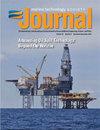利用低成本水下航行器对中孔珊瑚礁进行广域三维成像
IF 0.7
4区 工程技术
Q4 ENGINEERING, OCEAN
引用次数: 0
摘要
为了了解珊瑚礁消亡和恢复的原因,调查和监测是研究珊瑚礁生物学和生态学的必要条件。然而,与浅层珊瑚生态系统相比,中孔珊瑚生态系统(MCEs)在很大程度上仍然未知,因为很难观察到30米以下的海底。在此,我们提出了一种使用低成本自主水下航行器(AUV)的海底观测方法。该方法的发展是为了方便许多人进行mce的水下观测,也适用于一般的海底调查,如水下人工结构,热液喷口场等。该方法具有三个重要属性,以实现有效的调查。首先,它可以应用于高度崎岖的地形,使AUV能够以高速(最大时速)跟踪全向表面。~ 1 m / s)。其次,它可以基于深度传感器生成可靠的海底三维(3D)图像。第三,它可以用来估计流速场。提出的方法通过AUV HATTORI-2进行了测试,这是一种轻型的单人便携式AUV,配备了商用现成的传感器。我们的研究区域是南琉球的Sekisei泻湖,它代表了日本最大的珊瑚礁群。该方法不仅可以获得捕获海洋栖息地详细特征的宽分辨率介孔珊瑚礁三维图像,还可以获得与三维图像在空间和时间上一致的流速场和海水温度等环境数据。本文章由计算机程序翻译,如有差异,请以英文原文为准。
Wide-Area Three-Dimensional Imaging of Mesophotic Coral Reefs Using a Low-Cost AUV
Abstract Surveys and monitoring are essential to study the biology and ecology of coral reefs in order to understand the reasons behind reef demise and recovery. However, mesophotic coral ecosystems (MCEs) remain largely unknown compared to their shallow counterparts because
it is difficult to observe the seafloor below 30 m depths. Here, we propose a seafloor observation method using a low-cost autonomous underwater vehicle (AUV). This method was developed to allow many people to easily perform underwater observations of MCEs, and is also applicable to general
seafloor surveys, such as underwater artificial structures, hydrothermal vent fields, etc. The method possesses three important attributes to achieve effective surveys. First, it can be applied in highly rugged terrains and enables the AUV to track omnidirectional surfaces at high speed (Max.
~1 m/s). Second, it can produce a reliable three-dimensional (3D) image of the seafloor based on a depth sensor. Third, it can be used to estimate the flow velocity field. The proposed method was tested by using the AUV HATTORI-2, which is a lightweight, one-man portable AUV equipped
with commercial off-the-shelf sensors. Our study area is the Sekisei Lagoon in the South Ryukyus, which represents the largest coral reef complex in Japan. The method enabled us not only to obtain a wide and high-definition 3D image of mesophotic coral reefs that captures detailed characteristics
of marine habitats but also to acquire environmental data, such as flow velocity field and seawater temperature, spatially and temporally aligned with the 3D image.
求助全文
通过发布文献求助,成功后即可免费获取论文全文。
去求助
来源期刊

Marine Technology Society Journal
工程技术-工程:大洋
CiteScore
1.70
自引率
0.00%
发文量
83
审稿时长
3 months
期刊介绍:
The Marine Technology Society Journal is the flagship publication of the Marine Technology Society. It publishes the highest caliber, peer-reviewed papers, six times a year, on subjects of interest to the society: marine technology, ocean science, marine policy, and education.
 求助内容:
求助内容: 应助结果提醒方式:
应助结果提醒方式:


